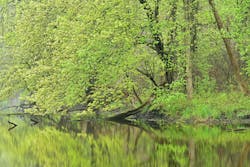Work to start at former landfill as part of EPA’s Superfund cleanup of Kalamazoo River
U.S. Environmental Protection Agency recently announced that work will begin in June to clean up polychlorinated biphenyls, or PCBs, at the former Allied Paper Landfill in Kalamazoo, Michigan, part of the Allied Paper Inc./Portage Creek/Kalamazoo River Superfund site. The current property owner, the Lyondell Environmental Custodial Trust, will conduct the cleanup under EPA’s supervision. The work involves consolidating and capping contaminated soil and installing a groundwater monitoring system at the site and is expected to take four years.
Historically, paper mills and landfills located along the Kalamazoo River and Portage Creek discharged PCB-laden waste and other contaminants into the waterways. Allied Paper built its landfill adjacent to the creek to dispose carbonless copy paper contaminated with PCBs. EPA added the site to the Superfund National Priorities List in 1990.
PCBs are a group of man-made organic chemicals that are known as chlorinated hydrocarbons. PCBs were domestically manufactured from 1929 until they were banned in 1979. PCBs do not readily break down in the environment and can bioaccumulate.
For more information visit: https://www.epa.gov/superfund/allied-paper-kalamazoo.
